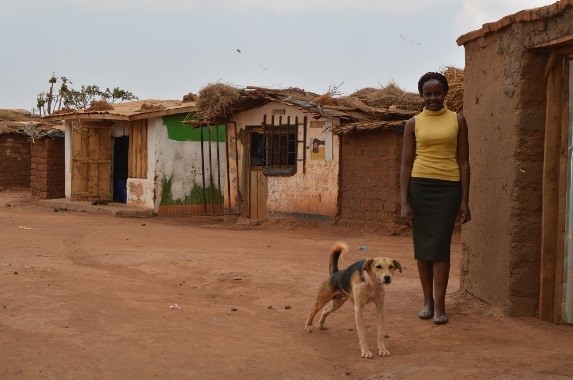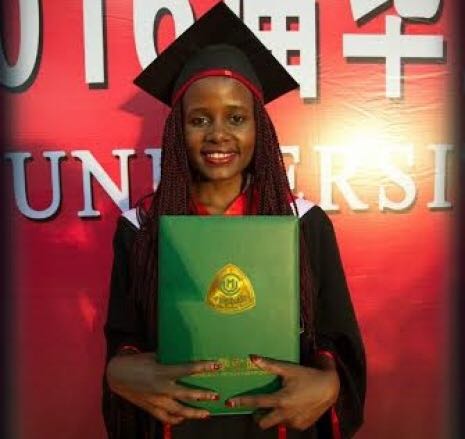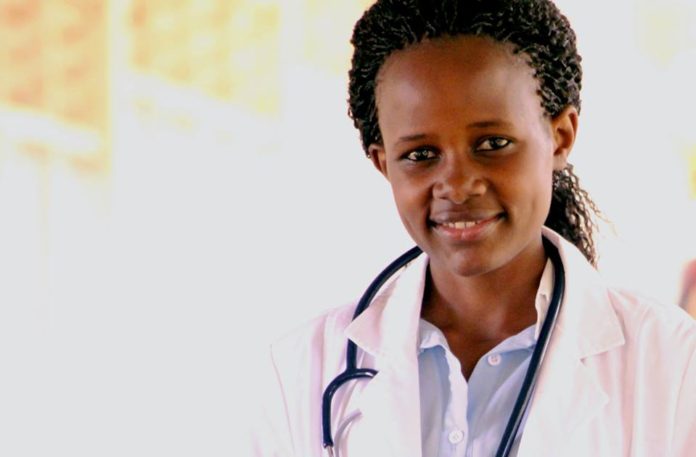Imagine you were born in Rwanda a couple of years into the 1990 Rwandan war. Imagine your father was killed in the 1994 genocide and your mother and extended family fled the country and took you to the neighbouring Congo, then called Zaire. Imagine your mother passed away in the forests of Congo, and you were left with your Grand-father to take care of you. Imagine the Congo war erupted and forced your family to flee even further from Rwanda, a journey that would last many more years and see you endure even more suffering and loses. Would you wonder the point of surviving the Rwanda war to see your life ending in the harsh journey of refugees condemned to be constantly on the move?
Today, I am inspired by Mireille Twayigira of Rwanda. Mireille was born in Butare, a province a couple of hours south of Rwanda’s capital Kigali. In those days, Butare was one of the ten prefectures of Rwanda (as provinces were then called), and home to two historical cities: the capital city of the Province, also called Butare, and the city of Nyanza.
To start with the latter, Nyanza was the capital of the former Kingdom of Rwanda for several centuries. Though the monarchy ended in the beginning of the sixties, the last two Royal Palaces and other vestiges of the kingdom are well preserved and curated by the national museum of Rwanda. The city of Butare, made history much later in our history, not in politics but rather in the sphere of science and academia, when it was chosen in 1965 – three years after the young republic’s proclamation and independence – to host the newly founded National University of Rwanda.
Mireille has fond memories of her early childhood. Her grand-parents’ house was close to her parents and her sister and her used to go and play there. She remembers having a cow, which she had received from her family, and enjoying drinking fresh milk.
The paradisiac life was to abruptly end in 1994. Mireille was only two and a half years when the Genocide started. In April 1994, her father was killed, and his body brought back home, wrapped in a blue fabric. The burial was very strange for the little girl, who did not understand what was happening.
Shortly after, her mother’s family decided to take them, her mother and two daughters, and flee the mass killings. They first moved to a neighbouring district. Her younger sister, who was just one, became sick and rapidly passed away before they could get medical help.
The genocide was fast approaching the area where they had found refuge, so they decide to flee the country all together. The closest border was the Burundi border, south of Butare.
They didn’t think of anything else, just survival. They crossed Burundi and found their way to a refugee camp in what was called then Zaire (now known as the Democratic Republic of Congo), the refugee camp of Cimanga. Cimanga was in South Kivu region, about 75 kilometres from Bukavu.
The conditions in the refugee camp, installed a vast bare area far from everything, without the most basic amenities were untenable. It wasn’t long before hundreds of refugees succumbing to hunger and all sorts of illness, including dysentery, malaria and others. Amongst them, Mireille’s mother. Within a few months, her life as a happy little girl had turned into the nightmarish fate of an orphan child in a foreign land.
This wasn’t the end of their plight, life still had more challenges in store for them. In November 1996, the Rwanda war spilled over into the Congo and forced Refugees to pack their things and flee the combat zone. They run to hide in the forest, and her extended family was separated. From there on, she stayed with her grand-parents.
The five years old Mireille and her grand-parents made their way through the forests. The little food they had managed to carry with them when they fled Cimanga was finished, so they started begging inhabitants of the villages they cross to show merci and feed them. When they couldn’t find any, they would eat fruits from the forest.
They travelled by foot, and when their shoes were so used, they had to cover their feet with vegetal material and keep on going. There were days it was so hot, their feet burned on the tarmac roads. But there was no time to think of the pain or hunger. All that mattered was to survive.
“It was survival of the fittest” Mireille says. “We escaped death from so many things, hunger, bullets, drowning, wild animals. No child should go through what I went through. In fact, no one should go through that.”
Soldiers often came and took young boys to make them child soldiers, and those who returned to the camps were scared and traumatized for life. The soldiers also took young girls for sexual exploitation. But thank God, Mireille was too young and was spared.
They ended up finding themselves in Angola, further and further away from Rwanda. One year through this long journey, as they crossed Angola and before they could reach a refugee camp, her grand-mother was too weak to continue, and she passed away.
This time, the little six years old didn’t cry, as though her heart had hardened from all the things her innocent eyes had seen. Mireille was also very weak from malnutrition and hunger and hadn’t they reached the refugee camp, she most likely would have died too.
Her grand-father became everything for her, her dad, her mom, her friend, her protector. The closest family she would ever know for the rest of her life.
Life in Angola wasn’t untenable, so they went on and travelled to Zambia. They lived in a refugee camp but her grand-father decided to go to the capital Lusaka, to try and find a way to make a life and take care of his grand-daughter. His dream was to put her in school and give her better chances to move away from the life they had.
He later heard of a refugee camp in Malawi where they had good schools for refugee kids, and he decided that’s where they should be. He managed to find the bus fare, and in September 2000, her grand-father and her arrived in Dzaleka refugee camp, a few kilometres north of Lilongwe, Malawi’s capital.
Life in Malawi was different from what she experienced before. Malawian were very friendly and welcoming, treating everyone as their own. A landlocked country in south-eastern Africa, between Mozambique, Tanzania and Zambia, Malawi has two major refugee camps, Luwani and Dzaleka, respectively south and north of Lilongwe, Malawi’s capital.
Dzaleka refugee camp was established by the United Nations High Commission for Refugees (UNHCR) in 1994 in response to a wave of forcibly displaced people fleeing genocide, violence and wars in Central and Eastern Africa. Originally built for 9000 people but by the time Mireille reached there, they were hosting more than twice that number.

Some refugees stay there for a brief time before heading to South Africa, the big economic powerhouse of Austral Africa. But Mireille’s family opted to stay there and make a life in Malawi. Her grand-father was happy to see how quickly she was progressing in school and wouldn’t had wanted to uproot her again.
Mireille attended school in Umodzi Katupya Primary School, which was run by the Jesuit Refugee Service, an international catholic NGO which serves, accompanies and advocates on behalf of refugees and other forcibly displaced persons around the world. The young girl was smart and more mature than other girls of her age. She gave everything she had to her education and rapidly rose at the top of her class. After completing her primary school, Mireille was selected to study at Likuni Secondary school, a catholic school in Lilongwe and the Jesuit Mission paid for her school fees.
Can we say that this is our happy ever moment, the moment where everything falls in place and Mireille can finally have a normal life? Unfortunately, no; the angel of death wasn’t done with young Mireille.
She was in her second year at Likuni, in 2007, when she was called and informed that her grand-father had been sick and had passed away. She was crushed! Despite the pain, she decided to honour her grand-father by continuing to work hard in school and prepare the future he had dreamed for her. Her hard-work paid off: in 2009, two years after the passing of her beloved grand-father, Mireille scored the highest scores of her school in all the six subjects of the national School Certificate of Education Examinations (MSCE).
Nationwide, Mireille came amongst the top 10 best students in the country.
Her results automatically qualified her for a Zodiak Best Girl Award Scholarship, a scholarship program rewarding the 10 girls who scored the highest marks on the MSCE every year. The initiative has been organised by Zodiak Broadcasting Station, a private radio station in Malawi, since 2006. In partnership with local and international partners, Zodiak has sent to-date more than 40 girls to study in universities in Malawi and abroad. During the 2009 Zodiak award ceremony, Mireille learned that the Chinese Embassy was offering the 10 awardees full scholarships to go and study in China!
When the department of education reviewed the files of the scholarship recipient they realised she wasn’t eligible. Why? For the simple fact that she wasn’t a citizen. Although she had lived in the country for almost 10 years, Mireille was still a refugee and didn’t hold any passport!
The young girl who had lost her father to genocide, her sister and mother to illness, who had lived in refugees camps all her life, who had walked barefoot as a child through forests of Congo and across three immense countries to try to find a place to call home, a girl who had never let anything defeat her, not even the death of her grand-father, had finally met an obstacle bigger than her and seemingly unsurmountable.
Should we end the story here and be content that at least she had tried? Not if you believe that God had bigger plans for her and wasn’t about to abandon her. A series of events were going to rapidly take place to keep her on that track to China.

The first event: the intervention of Zodiak on her behalf. When they learnt what had happened, the private radio decided to talk about the case on the waves to try and raise public awareness about this injustice. The public was really moved. There was a such a public outcry for Mireille that her case was tabled in …parliament!
Yes, the second event: the parliament of Malawi debating the case of the young refugee, in public sessions retransmitted on radio countrywide! Parliament concluded that it would be unfair to take away her opportunity and instructed the authorities to take all necessary measures to allow her to go for her education.
Hold on tight to your seat before I tell you of the third event. The Government of Malawi decided that the best way to ensure that she could fully benefit from her scholarship was to simply award her…the Malawian citizenship!
In the autumn of 2009, 15 years after fleeing her home-country, clinging onto a crispy new Malawian passport, Mireille bared her goodbyes to her friends from the refugee camp, boarded on a plane for the first time in her life to go and study medicine at Shenyang University in China.
It was a big cultural shock as you can imagine, studying such a complex field in a language she had never spoken nor written before. But Mireille had a very strong belief, the same belief that had carried her through all the difficulties of her life:
“God had not spared my life and taken me so far for myself. There were people I was meant to serve, and I had to be competent to serve them. And there were people I was meant to inspire, people I need to be a living proof for that there is God who works on their behalf.”
That strong faith carried her throughout her six years at Shenyang University. She courageously learned mandarin, one of China’s main languages, in a year and went on to complete her education. In July 2016, the 24 years old miracle girl turned doctor came back to Malawi, her adoptive country, ready to serve.
It was an emotional homecoming. Fifty refugees had come to wait for her and couldn’t hold back their tears when they saw her get off the plane. The press had come to report on her arrival and interviewed at Kamuzu International Airport (KIA) in Lilongwe, treating her like a real national hero. From the airport she went straight to her home in Dzaleka refugee camp, where other refugees had prepared a big celebration for the one amongst them who had made it.
Though she holds a Malawian passport and considers herself a Malawian, Mireille is fondly known in her adoptive country as the Rwandese girl who rose from refugeehood to become a doctor. Her case helped raise awareness on the plight of the refugee children and the forgotten lifelong victims our regional conflicts.
She is often invited to Dzaleka refugee camp and in schools to talk with young girls, which she does, tirelessly. In 2017, she was invited to speak at the Vatican, in Rome, at the annual ‘Voices of Faith’ event, an event aiming at bringing together leaders in the Vatican with the global Catholic community, so they can recognise that women have the expertise, skills and gifts to play a full leadership role in the Church. Other key speakers at that event included Maggy Barankitse of Maison Shalom of Burundi (I shared Maggy story in March 2018). She is a frequent speaker at events organised by the World Food Program and Zodiak in Malawi.
“Before I went to China, I used to look at myself as a girl with a tragic past. A tragedy and it ended there. But when I was in China, I realised I was more than that; I was a girl with a story to tell. A story of God’s love, a story of someone who has a lot to give especially now as a medical doctor. So, I try to find opportunities to try to speak with children in schools, trying to raise hope in youth, especially refugee youth, because I have a lot to share, having gone through what they are going through.”
She adds that there are many other Mireilles out there. “Unfortunately, their stories often end at the tragedy part. Many of them don’t even get to that safe place where their lives can move on, have a higher education and help build their country. Others get to that safe place, but because they’ve lost all their families, they are forced to be bread winners at a young age and cannot attend higher education,” she says.
“What is happening to innocent children is completely unfair, it needs to stop. I believe it starts within each one of us, with love, forgiveness and mercy.”
Today, Dr Mireille Twayigira works in the biggest referral hospital in Malawi and keeps close ties with her community in Dzaleka, where her life turned from ashes to beauty. Today, Dzaleka refugee camp is home to almost 60,000 refugees from Rwanda, Burundi, the Democratic Republic of Congo, Ethiopia and Somalia.
If you ask her what she misses from her native Rwanda, she will smile and answer: “The food. You can’t compare the food in the camp to that of my country,” she says. “We had all we needed: meat, potatoes, plantain, milk.”
Right Your Legacy, Dr Mireille, you are a true inspiration! Thank you for reminding us that there are so many of Rwanda’s children dispersed in the world trying to find that safe place where they can grow and be whole again.
Source: Um’Khonde Habamenshi





























































